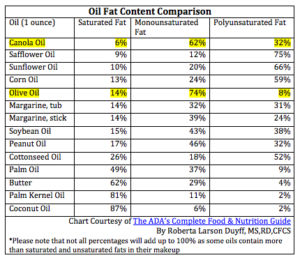Contents
Uses
Because of its light flavor, high smoke point, and smooth texture, canola oil is one of the most versatile cooking oils. You can use it in a number of dishes and cooking methods, like:
- As a cooking oil for sauteing, stir-frying, grilling, and baking
- In salad dressings, sauces, and marinades
- To coat your pans for nonstick baking
- Instead of solid fats (such as margarine and butter) in recipes
Benefits
- Canola oil is one of the best oils for heart health. Made from crushed canola seeds, it has less saturated fat than any other oil commonly used in the U.S.
- Check out the numbers: Canola oil has 7% saturated fat, compared to 12% for sunflower oil, 13% for corn oil, and 15% for olive oil.
- Cutting down on saturated fats helps cut your cholesterol levels.
- Canola oil is also very high in healthier unsaturated fats. It’s higher in the omega-3 fatty acid alpha-linolenic acid (ALA) than any other oil except flaxseed oil. ALA is particularly important to have in your diet because your body can’t make it.
- Studies show that ALA may help protect the heart through its effects on blood pressure, cholesterol, and inflammation. The FDA allows canola oil makers to label their products with a qualified health claim that there is “limited and not conclusive” scientific evidence that switching out saturated fat for the same amount of canola oil may reduce risk ofheart disease.
Cautions
- Debunking a Canola Oil Myth: Some Internet sites claim that canola oil has high levels of erucic acid, a substance that can be toxic to humans and can lead to ailments ranging from respiratory distress to blindness. But canola oil has levels of erucic acid well below the FDA’s standards.
Other Names
Rape Oil; Rapeseed oil; Brassica Napus
References
Source: By Stephanie Watson, “Canola Oil Cooking Benefits”. Reviewed by Kathleen M. Zelman, MPH, RD, LD on February 11, 2014, http://www.webmd.com/food-recipes/canola-oil

